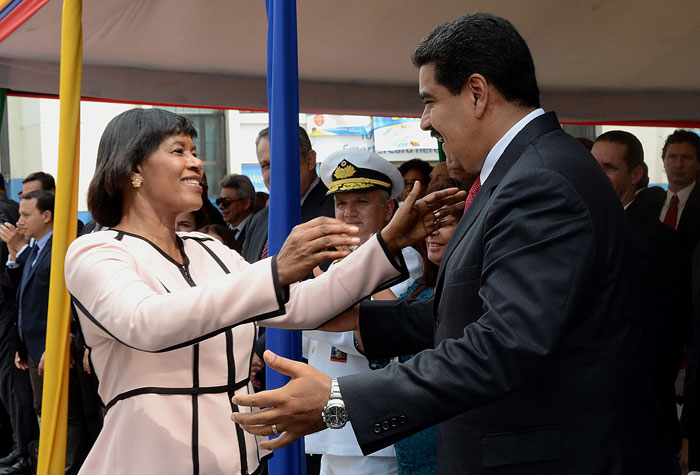Hugo Chávez Remembered as Great Friend of Jamaica
By: , September 14, 2015The Key Point:
The Facts
- Information Minister, Senator the Hon. Sandrea Falconer, said the late President is still revered by the Jamaican people.
- Minister Falconer said that PetroCaribe was the late President’s gift to the Jamaican people, which has served both the country and the region very well.
The Full Story
Former President of Venezuela, the late Hugo Chávez, was remembered as a great friend of Jamaica at a Regional Summit held in Montego Bay on September 5 to commemorate the 10th anniversary of the PetroCaribe Agreement.
Information Minister, Senator the Hon. Sandrea Falconer, said the late President is still revered by the Jamaican people.
Addressing a large contingent of Venezuelan journalists who accompanied current President of Venezuela, Nicolas Maduro, to the Summit, at a media briefing, the Minister said that PetroCaribe was the late President’s gift to the Jamaican people, which has served both the country and the region very well.
“We will never forget Hugo Chávez. Most Jamaicans revere him because of his vision and for what he has done to help our country’s economy. He was a great man and a great friend of this country,” she said.
For his part, Minister of Science, Technology, Energy and Mining, Hon. Phillip Paulwell, said that Mr. Chávez, ever the champion of the poor, was very insistent that social programmes in Jamaica had to benefit from the PetroCaribe Agreement, prompting the establishment of a PetroCaribe Development Fund, which was mandated to manage the savings from the arrangement.
“In accordance with the wishes of Mr. Chávez, savings from PetroCaribe have been spent widely across the society in a meaningful way and to the benefit of our people,” Mr. Paulwell said, adding that the money has been spent wisely on education, health care and on infrastructure, such as roads and highways.
PetroCaribe is an agreement between Venezuela and some Caribbean territories to purchase oil on preferential payment conditions. The agreement, which began in 2005, allows beneficiary nations to buy oil at market value, but only pay a percentage of the cost up front. The balance can be paid over 25 years at one per cent interest.
Meanwhile, former Prime Minister, the Most Hon. P.J. Patterson, under whose tenure the PetroCaribe Agreement was signed, proposed naming an academy after the late Venezuelan President to preserve both his memory and legacy to the region.
“Despite our financial restrictions, you the leaders who gather here should marshal the monetary and academic resources to build an institution of higher learning. Let it stand as an enduring testimony to Hugo Chávez, who in his short sojourn on our planet did make, indeed, a monumental difference on which this and succeeding generations must build,” he said.
Mr. Patterson said the PetroCaribe Agreement opened a new era of collaboration to uplift and advance the economic and social conditions of people within “our shores and territorial borders.”
He said Mr. Chávez was emphatic that it included those who have been historically oppressed and downtrodden.
Prime Minister, the Most Hon. Portia Simpson Miller, is already on record in lauding the late Venezuelan President as “an extraordinary son of the region” and “a great friend of Jamaica.”
Addressing the official launch of the photographic exhibition, ‘Chávez was here,” at the Tom Redcam Library in St. Andrew last year, Mrs. Simpson Miller said the late President’s legacy lives on through his many contributions to the region, noting that he was “a man with a generous heart, who had a strong sense of responsibility to this country and the region.”
She noted that the late President had a caring heart and was always willing to lend a helping hand to his Latin American and Caribbean brothers and sisters.
This, she said, was quite evident in his early response to the pleas for aid, following the devastating earthquake in Haiti in January 2010. He was also among those to respond when the islands of St. Vincent and the Grenadines and St. Lucia suffered severe infrastructural damage, following the passage of Hurricane Tomas that same year.


